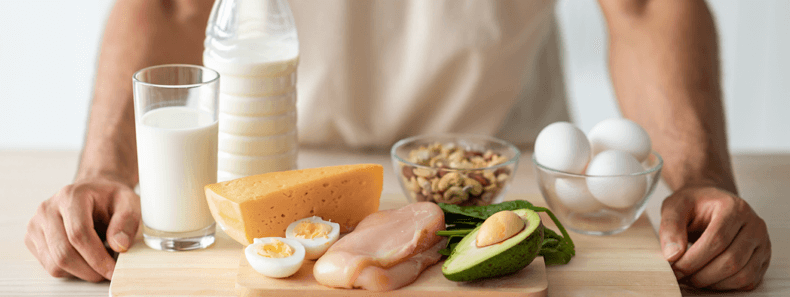The Power of Protein

Arguably, protein is probably the most important foundation component in our bodies. It is commonly known as ‘the building blocks of our bodies’. If you wanted to visualise protein, think of a long chain belt of small links put together. These links are known as amino acids, some of which are essential, and some not so important.
However, protein does not work alone, approximately half of the protein you consume for dietary purposes is to establish ‘enzymes’, who work on specific tasks. These enzymes break down or digest food, and other enzymes can assemble or synthesise new cells. Certain enzymes need specific vitamins and minerals to function.
Why does your body need proteins?
Proteins are found everywhere in your body, with no restrictions. They are present in every cell that needs to perform a certain important job, such as:
- Repair of skin, hair and nails (these are all made from keratin, which means ‘hard’ in Greek)
- Muscle function and stability in movement and motor
- Bone marrow – this soft, rubbery substance inside your bones is very rich in protein. It is an important part of a healthy body, and functions both in the manufacture of red blood cells, and in stem cells, the use of which can help in a variety of potentially serious illnesses.
- Cellular structure, function and regulation
- Hormone creation to regulate many bodily functions.
- Enzyme reactions that aid in different chemical bodily functions.
- Transporting and storing molecules throughout the body, like oxygen.
- Forming antibodies to fight off infections and prevent disease.
Although protein as a whole, is vital to life, every single protein has a specific function, as you can see. We need to eat a good amount of protein every day to help our health in general. Protein is vital to our existence, and one of the items tested here.
How much protein should I eat?
There are many food choices to enable you to glean enough protein. Whilst protein must be consumed, it is not wise to eat too much over the recommended daily amount, as this can cause problems with kidney function and other parts of the body. It can also bring on the early onset of diseases such as osteoporosis (weakening of the bone structure).
It is quite possible you may need to eat extra protein if you are highly active (such as marathon runner!) or in a particularly physical workplace. Regularly consuming protein throughout the day, is far better than eating it all in one go. The body does not store protein, so food is an essential part of the process. Also, pregnant women need to consume more, both during the ante-natal and post-natal periods.
Protein falls into the macronutrient group, which means that your levels should be up to speed at all times. The recommended intake amount is 46-63 grams with an average of 50g being the level for most people. You will find, however, that athletes and body builders will consume a lot more.
Top Protein-rich Foods
Lean Roast Lamb (6oz) 60.4g
Lean Chicken Breast (6oz) 54.5g
Lean Pork Chop (6oz) 52.7g
Tuna Steak (6oz) 50.8g
Beef steak (6oz) 48.7g
If you love meat, these levels will suit you. We placed tuna in the ranks purely because it is one of the top protein foodstuffs.
On average, most fish contain between 19g and 40g, so any fish and to a certain extent, seafood, will give you a fair amount of protein. This includes prawns, shrimp and lobster, and all the normal healthy fish containing omega-3 fatty acids.
Can you get enough protein from plant foods?
You can, but it is much harder than just picking a piece of fish or meat and you suddenly have all the daily protein that you need, and sometimes more. For vegetarians and vegans, most protein should come from pulses, legumes and items such as soy-based products. For instance, a cup of tofu is on average 43.5g, a cup of cooked soybeans comes in at a high rate of 31.3g, whereas a cupful of tempeh is higher at 33.7g. As you can see, soy products will certainly give you enough protein if accompanied by another protein product such as beans or legumes. Lentils for instance, have 17.9g of protein per cup.
Vegetables, nuts and grains all contribute to building protein levels, but not to the high levels of food listed above. They do, however, serve a very healthy contribution to other aspects of your health.
What are the signs of protein deficiency?
Extreme protein deficiency is quite rare in the Western World, but it does exist. However, there are certain vulnerable groups who could be prone to deficiencies, such as the elderly, already infirm in certain areas and compromised immune system.
The more noticeable symptoms can be:
- Skin, hair and nail problems – dryness of skin, lesions or marks, redness or nail flaking
- Bald patches or thinning of hair
- Depletion of muscle mass and leg strength (your muscles use the most protein in the body). This particularly manifests itself in the more elderly. It is usually the first noticeable thing with protein deficiency.
- Easily broken bones, due to thinning and wastage (the pre-cursor to osteoporosis).
- Weakening of the immune system, i.e., catching colds more frequently as well as other infections. This is more likely to occur when your protein intake is far too low.
These are the main symptoms in adults, but as usual, it varies from person to person. It seems too much of a price to pay for something that you can easily keep an eye on. Ensuring that you eat protein throughout the day, should keep you in optimum health.
